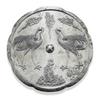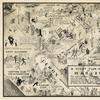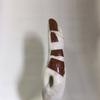U.S. Regulations on Ivory Sales May Change For Antique Trade
- September 16, 2015 13:17
For over a year, the antiques industry has been subject to tighter U.S. federal regulations on ivory sales. Congress will revisit this fall the 2014 regulations meant to protect an endangered species by curbing the ivory trade.
Maine Antique Digest reported: President Obama announced on July 25 "that the United States Fish and Wildlife Service (USFWS) is proposing revisions to the African elephant rule under Section 4(d) of the Endangered Species Act (ESA). The new rules would prohibit most non-antique interstate commerce (sales across state lines) in African elephant ivory and restrict commercial exports. Antiques, as defined by the ESA, are exempt from proposed new regulations." (See the rules here.)
Some legislators will push for an even softer regulatory stance on the ivory trade. “The administration's ivory rule is well-intentioned, but was not crafted carefully enough to account for law-abiding Americans who may possess legally obtained products containing ivory,” California's representative Ken Calvert (R.) told Reuters in a statement.
Pieces made with ivory are under special scrutiny in New York State, where restricted sales are limited to licensed dealers who keep inventories and provide documentation that pieces are at least 100 years old. In addition, proven antiques must contain limited amounts of ivory (20% or less) to be sold.
Antique specialists who say sales and imports are difficult under the new regulations maintain that their expertise allows them to identify antique, even centuries-old, ivory pieces made long before the 25-year-old international ban on harvesting elephant ivory.
Wildlife advocates and legislators argue that new ivory can be disguised as old, thus continuing the demand for tusks from poached African elephants.
An estimated 100,000 African elephants were killed by poachers between 2010 and 2012, according to a study last year by the National Academy of Sciences. Figures are not immediately available on the amount of new ivory transported into the U.S., or the black market imports of other countries with reported high-demand, such as China.















![Offering a Truce [Bested], 1895, is estimated to sell for between $1,300,000 and $1,800,000 on March 22, 2014, for The Russell: An Exhibition and Sale to Benefit the C.M. Russell Museum. Offering a Truce [Bested], 1895, is estimated to sell for between $1,300,000 and $1,800,000 on March 22, 2014, for The Russell: An Exhibition and Sale to Benefit the C.M. Russell Museum.](/images/c/a8/20/Dec10_Offering_a_Truce__Bested_300dpi100x100_c.jpg)




